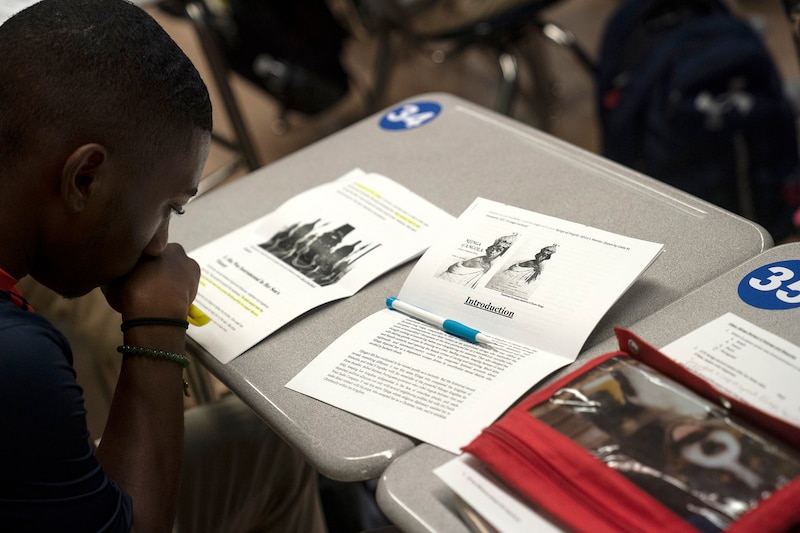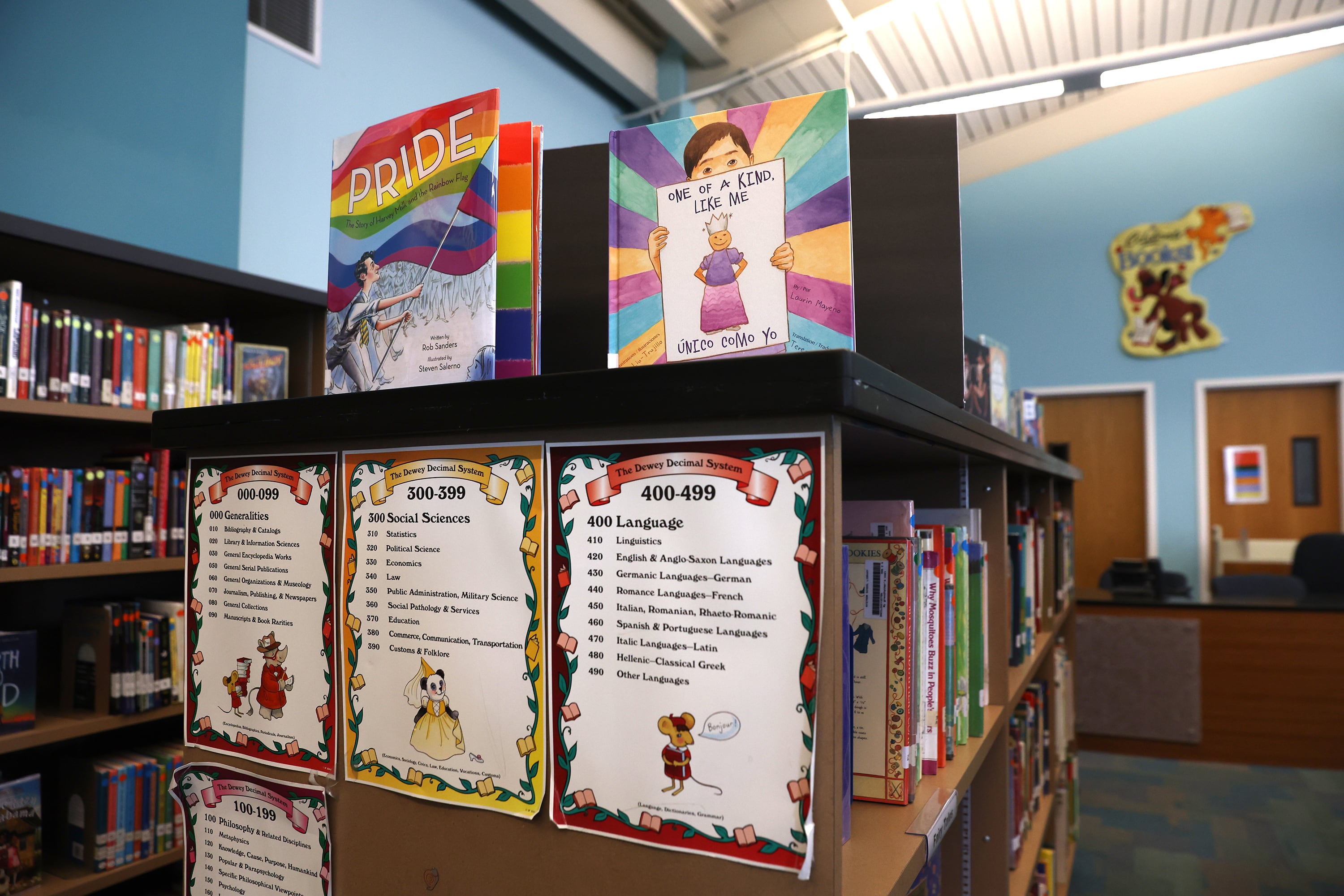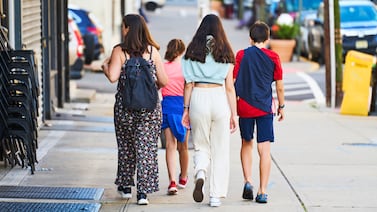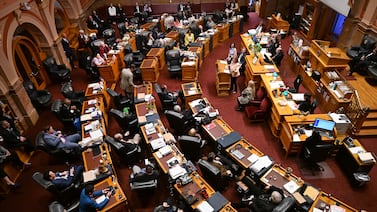Sign up for Chalkbeat’s free weekly newsletter to keep up with how education is changing across the U.S.
Should elementary schoolers learn that people of the same gender can love each other? Do teens want to learn about how slavery’s legacy matters today? Should parents be able to opt their kids out of lessons they disagree with?
As Republican-dominated state legislatures limit how teachers talk about race and restrict transgender children’s access to bathrooms and sports, and as school board elections turn on book bans and parents’ rights, three new national studies from the Pew Research Center, the research corporation RAND, and the University of Southern California’s Center for Applied Research in Education shed light on how teachers, parents, and students themselves think about these questions.
For all the attention LGBTQ issues receive in national politics, teachers said topics related to gender identity and sexual orientation rarely come up. And many said they don’t believe these topics should be taught in school.
In fact, large swaths of the public also don’t think gender and sexuality should be discussed in school, the studies found. However, there were wide partisan divides, as well as differences along racial and ethnic lines.
Adults and teens felt more comfortable with teachers teaching about racism than LGBTQ issues. They were also more comfortable with teachers talking about past injustices than present-day inequality, and more comfortable with gay rights than trans rights. And they were more comfortable with any of these topics coming up at the high school level — though many teens reported their own discomfort.
So it is perhaps unsurprising that two-thirds of teachers in one study said they decided on their own to limit how they talked about potentially contentious issues. One reason: They feared confrontations with upset parents.
“The topics of race and LGBTQ issues are often lumped together in discussions about these so-called ‘culture wars’ and how that’s playing out in K-12 education,” said Luona Lin, a research associate at Pew. But teachers and students actually “feel very different about these two topics.”
Here are some of the major takeaways of the three new reports:
Many teachers are censoring themselves
More than a third of American teachers work in states with laws restricting how teachers talk about issues that are considered divisive or controversial. But a study released this month by the research organization RAND found local restrictions and teachers’ own fears are having an effect as well.
In a survey of 1,500 teachers taken last year, two-thirds reported deciding on their own to limit how they talked about social and political issues in the classroom. Meanwhile, about half of teachers told RAND they were subject to either a state or local restriction. These limits could be formal, such as a school board policy, or informal, such as a principal’s comments.
More than 80% of those who were subject to a local restriction said they had made changes to their teaching, regardless of state law. That should not be surprising, said Ashley Woo, an assistant policy researcher at RAND.
“If your principal is telling you to do something, that is the person who is there with you at the school and can see what is happening in your classroom,” she said.
At the same time, more than half of teachers who were not subject to any restrictions said they had limited how they talked about certain topics, with self-censoring more common in conservative communities but still widespread in liberal ones.
A major reason teachers cited for limiting instruction, especially in communities with local restrictions, was a fear of confrontation with upset parents and that their administration would not support them if they faced a challenge.
LGBTQ issues raised less often than racism in classrooms
Though LGBTQ issues are prominent in local and national politics, a report released this week reveals a striking finding: Most teachers say gender identity and sexual orientation hardly get discussed in class — and many teachers say they shouldn’t be.
According to a nationally representative survey conducted last fall by the nonpartisan Pew Research Center, more than two-thirds of K-12 public school teachers said topics related to sexual orientation and gender identity rarely or never came up in their classroom last school year. Around 3 in 10 said the topics came up sometimes or often.
Half of teachers, meanwhile, said they thought students shouldn’t learn about gender identity at school, with an even higher share of elementary school teachers agreeing with that view.
The findings come as anti-trans legislation creates a more hostile environment for gender non-conforming youth in many states.
In contrast, more than half of teachers said they discussed topics related to racism or racial inequality at least sometimes. Around 4 in 10 teachers said the issues rarely or never came up.
Nearly two-thirds of teachers said students should learn about slavery and how it affects the lives of Black Americans today, while just under a quarter said slavery should be taught only as a component of history — without any bearing on the present.
Lin, the Pew report’s lead author, says it’s likely that school board policies, local politics, and state laws are influencing what teachers discuss, though the survey doesn’t measure those factors.
What should young kids learn about gender and sexuality?
In Searching for Common Ground, a study released this week by a team at the University of Southern California, researchers surveyed a representative sample of 3,900 adults, about half of them parents of school-aged children, and asked them about dozens of scenarios related to race, sexuality, and gender.
Democrats were more comfortable than Republicans with almost every scenario, with independents and others roughly in the middle. But even Democrats were less supportive of discussing gender identity or asking students’ pronouns in elementary school than discussing racism or different family structures.
Nearly half of all respondents thought it was appropriate for an elementary teacher to have a picture of their same-sex spouse on their desk. And almost as many were OK with elementary students reading a book about two male penguins adopting a baby penguin.
But just 30% of respondents and only half of Democrats thought it was appropriate for an elementary classroom to display LGBTQ-friendly decorations, such as a Pride flag.
Democrats were far more likely to want gay or trans children to see themselves reflected at school, while Republicans were far more likely to fear discussing these topics would change children, leading to them thinking they are gay or trans.
“The largest partisan examples seem to have to do with LGBTQ and family issues in elementary school,” said Morgan Polikoff, a USC education professor and one of the study’s lead authors. “Democrats think that kids can handle that and Republicans do not.”

More students feel comfortable discussing racism than LGBTQ issues
Students in grades 8-12 also tend to feel less comfortable discussing LGBTQ issues than issues of race and racism at school, and are more likely to say they shouldn’t be learning about them, the Pew report found.
In a nationally representative survey of 13- to 17-year-olds conducted last fall, around 4 in 10 teens said they felt comfortable when topics related to racism or racial inequality came up in class.
But only around 3 in 10 said the same about topics related to sexual orientation or gender identity. And just under half of teens said they shouldn’t learn about gender identity at school. That rate was somewhat higher for teens who identified as Republicans than Democrats.
Only 11% of teens, meanwhile, said they shouldn’t learn about slavery. Around half said they should learn about slavery and how it affects the lives of Black Americans today, while 40% said they should learn about slavery only in a historical context.
Black teens and teens who identify as Democrats were much more likely than white, Hispanic, or Republican teens to say they want to learn about how the legacy of slavery affects Black people today — a finding echoed among Black parents and Black teachers in other surveys.
Bridging these divides is tricky
The University of Southern California study found strong support for public education across the political spectrum.
But there’s a gap of nearly 39 percentage points between Democrats and Republicans on whether public schools should teach children to embrace differences. Nearly three-quarters of Democrats said yes, compared with just over a third of Republicans.
This underlying belief was a strong predictor of responses to specific scenarios. Those who said kids shouldn’t be taught to embrace differences also expressed more discomfort with race, gender, and sexuality being discussed in the classroom.
“Democrats on average think schools are exactly the place to do this — it’s one of the last places where everyone comes together regardless of their differences,” Polikoff said. “And Republicans don’t think that is an appropriate role for schools. And they think that because they perceive, in part correctly, that schools are a liberalizing force.”
There was broad support for parents having the right to opt their child out of certain lessons, but when researchers prompted respondents to consider downsides, such as their child missing out on the opportunity to learn critical thinking skills, support fell.
Understanding the values that drive differences and building on common ground, such as agreement that children should read books by authors of color and learn about historic injustices, could lead to a healthier conversation than what’s happening now.
“We need to have this conversation,” he said. “Instead we have Ron DeSantis saying we’ll ban everything, and Democrats sticking their fingers in their ears and saying you’re all bigots.”
Erica Meltzer is Chalkbeat’s national editor based in Colorado. Contact Erica at emeltzer@chalkbeat.org.
Kalyn Belsha is a senior national education reporter based in Chicago. Contact her at kbelsha@chalkbeat.org.







